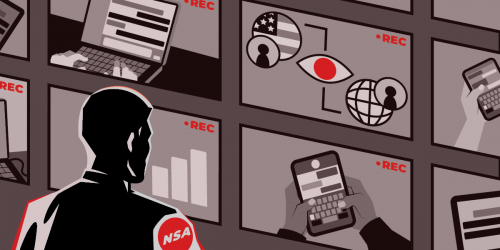The latest evidence that Section 702 of the Foreign Surveillance Intelligence Act (FISA) must be ended or drastically reformed came last month in the form of a newly unsealed order from the Foreign Intelligence Surveillance Court (FISC) detailing massive violations of Americans’ privacy by the FBI.
The FISC order is replete with problems. It describes the government’s repeated, widespread violations—over a seven-year period—of procedures for searching its databases of internet communications involving Americans, all without a warrant. These searches included especially sensitive people and groups, including donors to a political campaign. And it shows the FISC giving the FBI all-but-endless do-overs, each time proclaiming that the executive branch has made “promising” steps toward compliance with procedures that are largely left up to government attorneys to design.
Perhaps most shocking, however, is the court’s analysis of how the Fourth Amendment should apply to the FBI’s “backdoor searches” of Americans’ communications. These searches occur when the FBI queries Section 702 data that was ostensibly collected for foreign intelligence purposes without a warrant but includes a person on U.S. soil in the communication.
Although the court acknowledged that the volume of Americans’ private communications collected using Section 702 is “substantial in the aggregate,” and that the FBI routinely searches these communications without a warrant for routine matters, it held that the government’s oft-broken safeguards are consistent with the Fourth Amendment and “adequately guard against error and abuse.” When EFF writes that Section 702 and similar programs have created a “broad national security exception to the Constitution,” this is what we mean.
As long as Section 702 has been debated, its defenders have assured the public that the FISC is just like any other federal court: independent from the executive branch under Article III of the Constitution and charged with protecting individual rights. But as this latest order shows, the FISC’s performance of this duty bears no resemblance to how other Article III courts have treated the same questions, even when those courts have been hamstrung by unwarranted secrecy around the facts of national security surveillance.
Case in point is the U.S. Court of Appeals for the Second Circuit’s 2019 opinion in United States v. Hasbajrami. Hasbajrami was a criminal case in which government agents read a US-resident’s emails collected using Section 702 and charged him with supporting a terrorist organization. As with every other criminal prosecution involving FISA, the defense did not have access to evidence about how the government actually used 702 to surveil Hasbajrami. Yet even with this unfairly narrow review, on appeal the Second Circuit pressed the government on important constitutional questions, including backdoor searches. It even ordered the government to submit additional briefing on why backdoor searches did not violate the Fourth Amendment.
In its Hasbajrami opinion, the Second Circuit wrote that regardless of the procedures the FBI put in place for backdoor searches, these searches must be treated as “separate Fourth Amendment events.” In other words, each and every time the government runs one of these searches, it must ensure it is not unreasonably violating Americans’ privacy. The court’s reasons for reaching this conclusion are noteworthy:
(1) Under Supreme Court precedent, just because the government comes into possession of a person’s private communications—as the NSA does routinely with Section 702— the government is not necessarily allowed to read them without getting a warrant.
(2) The “vast technological capabilities” of Section 702 mean that the government can simply throw Americans’ communications into databases and search them at a later date unrelated for a purpose unrelated to the original “incidental collection.”
(3) Even though Section 702 prohibits directly targeting US residents, the “the NSA may have collected all sorts of information about an individual, the sum of which may resemble what the NSA would have gathered if it had directly targeted that individual in the first place.”
(4) The agency running the searches matters. The example the court gave that would raise Fourth Amendment concerns? “FBI queries directed to a larger archive of millions of communications collected and stored by the NSA for foreign intelligence purposes, on the chance that something in those files might contain incriminating information about a person of interest to domestic law enforcement.” That's exactly the issue that was before the FISC in this latest opinion.
Clearly, the Second Circuit opinion raises a number of serious questions about whether a single backdoor search is constitutional. That concern is compounded by the hundreds of thousands of searches done by the government’s aggregate querying under Section 702, representing a massive violation of Americans’ privacy.
Even if the FISC did not wrestle with these questions adequately in the past—and it didn’t—you would expect the court to take notice of the Hasbajrami opinion and offer its own analysis. You’d be wrong. The newly unsealed opinion is apparently the first time the FISC has considered Hasbajrami, and in just over a page, the FISC wrote that it “respectfully” disagreed that each search should be viewed as a separate Fourth Amendment event. Instead, it “adhered” to its previous conclusion that the government’s own procedures safeguard privacy “as a whole.” So the scope of the collection and searching was irrelevant, as was the government’s consistent inability to even follow its procedures. But as we’ve said before, allowing the government to claim that protocols are sufficient to protect our constitutional rights turns the Fourth Amendment on its head.
The FISC’s treatment of backdoor searches makes a mockery of the right to privacy. In Hasbajrami, the court did not have a record of backdoor searches run against Mr. Hasbajrami, meaning that it could not say definitively what the Fourth Amendment required. In this FISC opinion, however, the court was presented with an extensive record of backdoor searches—as well as the ability to supplement the factual record to its satisfaction— and the court nevertheless refused to confront what was staring it in the face.
The FISC’s refusal to enforce the Fourth Amendment is yet another reason the surveillance enabled by Section 702 needs to be ended or drastically reformed. A starting point is a requirement in the law itself that the government obtain a warrant before searching its databases for Americans’ communications, which would address the Second Circuit’s concerns in Hasbajrami. Our privacy should not depend on the FBI’s self-policing and the secret court’s contorted interpretation of the Constitution.







